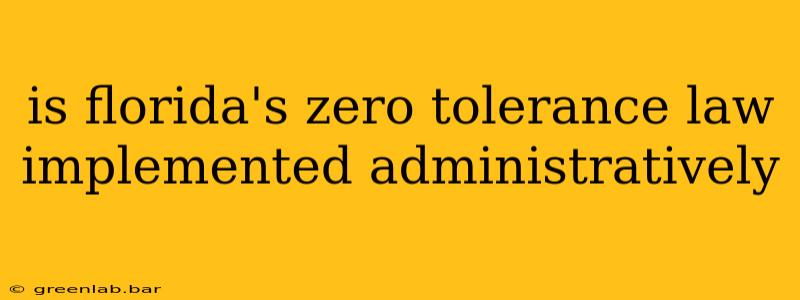Florida's zero-tolerance laws, particularly concerning school discipline, are a complex issue often misunderstood. While the term "zero tolerance" implies a strictly enforced, inflexible rule, the reality of its implementation is far more nuanced and involves a significant administrative component. This post will delve into the administrative aspects of Florida's zero-tolerance policies, examining how they are applied in practice and the factors influencing their enforcement.
Understanding Florida's Zero Tolerance Policies
Florida's zero-tolerance policies, primarily focused on schools, aim to create a safe and orderly learning environment by swiftly addressing certain behaviors. These policies typically cover a range of infractions, including:
- Possession of weapons: This includes firearms, knives, and other potentially dangerous items.
- Drug-related offenses: This encompasses possession, use, or distribution of illegal substances.
- Violence and assault: This includes physical altercations, threats, and bullying.
- Certain disruptive behaviors: These can vary depending on the school district and may include fighting, vandalism, or insubordination.
It's crucial to understand that these aren't monolithic policies; their specific application varies considerably across different school districts and even individual schools. The level of administrative involvement in their implementation also differs accordingly.
The Administrative Role in Enforcement
The administrative implementation of Florida's zero-tolerance policies is multi-layered:
1. Policy Creation and Dissemination:
School districts are responsible for creating and adopting their own specific zero-tolerance policies, often guided by state laws and regulations. These policies are then disseminated to students, parents, and staff through handbooks, websites, and other communication channels. This initial stage is entirely administrative, involving the drafting, review, and approval of the policies by school boards and administrative personnel.
2. Incident Reporting and Investigation:
When an incident occurs, school staff are required to report it through established administrative channels. This reporting process often involves filling out specific forms, documenting the event, and gathering evidence. School administrators then conduct investigations to determine the facts of the incident, often interviewing witnesses and reviewing security footage. This investigative process is a key administrative function in the enforcement of zero-tolerance policies.
3. Disciplinary Actions:
Based on the investigation's findings, administrators determine the appropriate disciplinary action. While the policy might dictate a specific consequence for certain violations (e.g., automatic suspension for weapon possession), administrators retain considerable discretion in determining the severity of the punishment based on the context of the incident and the student's history. This discretionary element adds another layer of administrative involvement.
4. Appeals and Due Process:
Students and parents often have the right to appeal disciplinary decisions through established administrative procedures. These appeals may involve hearings, reviews by higher-level administrators, or even legal action. The administrative process is designed to ensure fairness and due process in the application of zero-tolerance policies.
Challenges and Criticisms
Despite the intent behind Florida's zero-tolerance policies, their administrative implementation faces several challenges and criticisms:
- Lack of flexibility: Critics argue that the rigid nature of some zero-tolerance policies doesn't account for individual circumstances, leading to disproportionate punishment.
- Disparities in enforcement: Studies have shown that zero-tolerance policies may be applied inconsistently across different schools and student populations, leading to inequitable outcomes.
- Resource limitations: The administrative burden of effectively investigating and addressing every incident can strain school resources, particularly in underfunded districts.
Conclusion
Florida's zero-tolerance laws aren't simply implemented; their execution is a complex administrative process involving policy creation, investigation, disciplinary action, and appeals. While aiming for safety and order, the effectiveness and fairness of these policies depend heavily on the responsible and equitable administration of the process. The administrative aspects are crucial to ensuring that these policies are applied justly and effectively, avoiding the pitfalls of inflexible and potentially discriminatory enforcement. Ongoing review and adjustments to both the policies and their implementation are necessary to ensure a fair and safe learning environment for all students.

